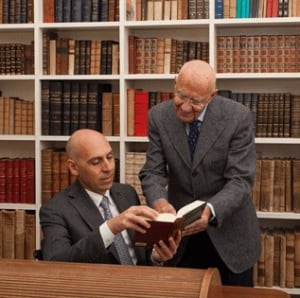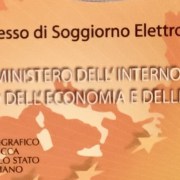Avvocato – Frequently Asked Questions
What does avvocato mean?
The Italian word, avvocato, has three main equivalent terms in English: lawyer, solicitor, attorney.
How long does it take to become an avvocato?

Left: Giandomenico De Tullio. Managing Partner. Right Giovanni De Tullio. Founding Partner. De Tullio Law Firm.
The path to becoming an avvocato in Italy involves several years of study and internships.
Firstly, future lawyers need to complete a Bachelor’s Degree in law, (Laurea in Scienze Giuridiche), which takes three years.
Secondly, to proceed along the path towards practising law, students require a two-year post-graduate degree (Laurea Specialistica in Giurisprudenza) or, a further five-year Master’s Degree (Laurea a ciclo unico Magistrale in Giurisprudenza).
Thirdly, after attaining the aforementioned qualifications, an avvocato needs to complete a two-year internship at an established law firm.
Finally, in order to practice law, an avvocato must pass the Italian Bar Exam. After registering with the Italian Law Society (Consiglio dell’Ordine degli Avvocati), Italian lawyers can practice Italian law wherever they choose in Italy.
What is an Italian attorney’s scope of legal practice?
The legal competencies of a qualified avvocato are wide-ranging. They comprise all areas of the law: civil, criminal, labour, bankruptcy, financial, administrative, inheritance and succession cases. In addition an avvocato handles court trials and appeals.
Is an Italian avvocato subject to a code of conduct?
A strict ethical code of conduct governs an Italian avvocato and the performance of their duties. Firstly, Italian attorneys must base their conduct on respect for integrity, dignity and decorum. Failure to comply with this ethical code of conduct leads to disciplinary proceedings.
The legal profession demands honesty and integrity. It is not permissible for an Italian attorney to start a legal action or take part in a proceeding, which may be construed as acting in bad faith.
Secondly, the Italian legal code of conduct safeguards the client. An Italian avvocato has a duty of care and loyalty towards a client. An Italian attorney behaving contrary to clients’ interests, or taking on a case that they are not competent to conduct, would be a breach of this code of conduct.
Does client confidentiality exist in the Italian legal profession?
Yes. Another fundamental duty for an Italian attorney is confidentiality. On the one hand this regards the provision of services to a client. On the other hand it pertains to any information given to a lawyer by the client, or which becomes known to the lawyer. Confidentiality remains valid for information about former clients, or where the attorney, despite knowing the details of a case, does not agree to take on a case.
The relationship between an Italian attorney and a client is fundamentally based on trust; an attorney must defend a client’s interests as well as possible within the framework of legal representation and in compliance with the law and the ethical principles of the legal code of conduct.
Finally …
At De Tullio Law Firm, we have extensive knowledge and experience of Italian and international law. For over 55 years, we have been providing expert legal services throughout Italy. Whatever your legal need in Italy, get in touch with us for a free consultation.
You may also be interested in De Tullio Law Firm: celebrating 55 years in practice.
Get All Our FREE Guides for Foreigners Planning to Buy, Sell or Live in Italy
Our PDF guides give you all the knowledge you need to move your Italian dream forward with confidence
Download now









